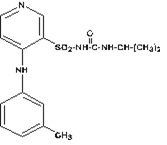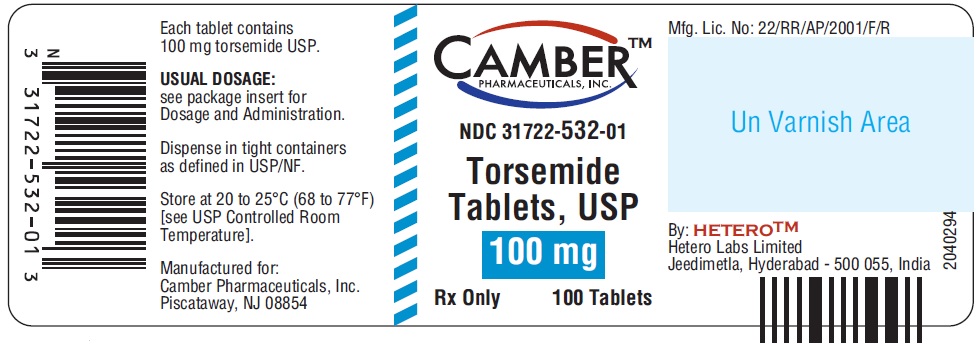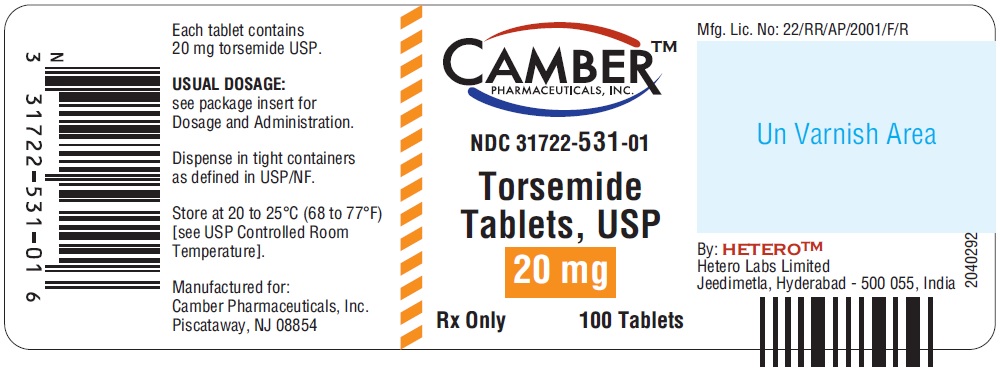Drug Catalog - Product Detail
Torsemide Tab 10 MG 100 EA
| NDC | Mfr | Size | Str | Form |
|---|---|---|---|---|
| 31722-0530-01 | CAMBER PHARMACEUTICALS | 100 | 10MG | TABLET |
PACKAGE FILES






Generic Name
TORSEMIDE
Substance Name
TORSEMIDE
Product Type
HUMAN PRESCRIPTION DRUG
Route
ORAL
Application Number
ANDA079234
Description
11 DESCRIPTION Torsemide is a diuretic of the pyridine-sulfonylurea class. Its chemical name is 1-isopropyl-3-[(4-m-toluidino-3-pyridyl) sulfonyl]urea and its structural formula is: Its molecular formula is C 16 H 20 N 4 O 3 S, its pKa is 6.42, and its molecular weight is 348.43. Torsemide USP is a white to off-white crystalline powder. The tablets for oral administration also contain crospovidone, lactose monohydrate, magnesium stearate, microcrystalline cellulose and povidone. Torsemidestructure
How Supplied
16 HOW SUPPLIED/STORAGE AND HANDLING Torsemide tablets USP, 5 mg are white to off white, oval shaped, scored tablets, debossed with ‘56’ on scored side and ‘H’ on the opposite side. They are supplied as follows: 31722-529-01, bottle of 100 31722-529-05, bottle of 500 Torsemide tablets USP, 10 mg are white to off white, oval shaped, scored tablets, debossed with ‘57’ on scored side and ‘H’ on the opposite side. They are supplied as follows: 31722-530-01, bottle of 100 31722-530-05, bottle of 500 Torsemide tablets USP, 20 mg are white to off white, oval shaped, scored tablets, debossed with ‘59’ on scored side and ‘H’ on the opposite side. They are supplied as follows: 31722-531-01, bottle of 100 31722-531-05, bottle of 500 Torsemide tablets USP, 100 mg are white to off white, oval shaped, scored tablets, debossed with ‘60’ on scored side and ‘H’ on the opposite side. They are supplied as follows: 31722-532-01, bottle of 100 31722-532-05, bottle of 500 Storage Store at 20° to 25°C (68° to 77°F) [see USP Controlled Room Temperature]
Indications & Usage
1 INDICATIONS & USAGE Torsemide tablets are a loop diuretic indicated for: • the treatment of edema associated with heart failure, renal disease or hepatic disease. (1.1) • the treatment of hypertension, to lower blood pressure. Lowering blood pressure reduces the risk of fatal and nonfatal cardiovascular events, primarily strokes and myocardial infarctions. (1.2) 1.1 Edema Torsemide tablets are indicated for the treatment of edema associated with heart failure, renal disease or hepatic disease. 1.2 Hypertension Torsemide tablets are indicated for the treatment of hypertension, to lower blood pressure. Lowering blood pressure reduces the risk of fatal and nonfatal cardiovascular events, primarily strokes and myocardial infarctions. These benefits have been seen in controlled trials of antihypertensive drugs from a wide variety of pharmacologic classes including the class to which this drug principally belongs. There are no controlled trials demonstrating risk reduction with torsemide. Control of high blood pressure should be part of comprehensive cardiovascular risk management, including, as appropriate, lipid control, diabetes management, antithrombotic therapy, smoking cessation, exercise, and limited sodium intake. Many patients will require more than one drug to achieve blood pressure goals. For specific advice on goals and management, see published guidelines, such as those of the National High Blood Pressure Education Program’s Joint National Committee on Prevention, Detection, Evaluation, and Treatment of High Blood Pressure (JNC). Numerous antihypertensive drugs, from a variety of pharmacologic classes and with different mechanisms of action, have been shown in randomized controlled trials to reduce cardiovascular morbidity and mortality, and it can be concluded that it is blood pressure reduction, and not some other pharmacologic property of the drugs, that is largely responsible for those benefits. The largest and most consistent cardiovascular outcome benefit has been a reduction in the risk of stroke, but reductions in myocardial infarction and cardiovascular mortality also have been seen regularly. Elevated systolic or diastolic pressure causes increased cardiovascular risk, and the absolute risk increase per mmHg is greater at higher blood pressures, so that even modest reductions of severe hypertension can provide substantial benefit. Relative risk reduction from blood pressure reduction is similar across populations with varying absolute risk, so the absolute benefit is greater in patients who are at higher risk independent of their hypertension (for example, patients with diabetes or hyperlipidemia), and such patients would be expected to benefit from more aggressive treatment to a lower blood pressure goal. The antihypertensive effects of torsemide tablets are on the average greater in black patients than in nonblack patients [see Clinical Pharmacology (12.2)] . Some antihypertensive drugs have smaller blood pressure effects (as monotherapy) in black patients, and many antihypertensive drugs have additional approved indications and effects (e.g., on angina, heart failure, or diabetic kidney disease). These considerations may guide selection of therapy. Torsemide tablets can be used alone or in combination with other antihypertensive agents.
Dosage and Administration
2 DOSAGE & ADMINISTRATION Edema associated with: • Heart failure: Initial dose is 10 or 20 mg once daily. Titrate by factors of two; doses above 200 mg have not been studied. (2.1) • Chronic Renal Failure: Initial dose is 20 mg once daily. Titrate by factors of two; doses above 200 mg have not been studied. (2.1) • Hepatic Cirrhosis: Initial dose is 5 or 10 mg once daily. Titrate by factors of two; doses above 40 mg have not been studied. (2.1) Hypertension: • The recommended initial dose is 5 mg once daily. After 4 to 6 weeks, increase to 10 mg once daily, if needed. If 10 mg is insufficient, consider adding another agent. (2.2) 2.1 Treatment of Edema Edema associated with heart failure The recommended initial dose is 10 mg or 20 mg oral torsemide tablets once daily. If the diuretic response is inadequate, titrate upward by approximately doubling until the desired diuretic response is obtained. Doses higher than 200 mg have not been adequately studied. Edema associated with chronic renal failure The recommended initial dose is 20 mg oral torsemide tablets once daily. If the diuretic response is inadequate, titrate upward by approximately doubling until the desired diuretic response is obtained. Doses higher than 200 mg have not been adequately studied. Edema associated with hepatic cirrhosis The recommended initial dose is 5 mg or 10 mg oral torsemide tablets once daily, administered together with an aldosterone antagonist or a potassium-sparing diuretic. If the diuretic response is inadequate, titrate upward by approximately doubling until the desired diuretic response is obtained. Doses higher than 40 mg have not been adequately studied in this population. 2.2 Treatment of Hypertension The recommended initial dose is 5 mg once daily. If the 5 mg dose does not provide adequate reduction in blood pressure within 4 to 6 weeks, increase to 10 mg once daily. If the response to 10 mg is insufficient, add another antihypertensive agent to the treatment regimen.
